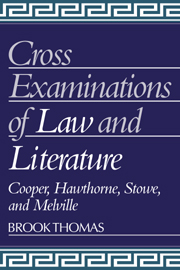Book contents
- Frontmatter
- Contents
- Acknowledgments
- List of abbreviations
- An Opening Statement
- PART I INDIVIDUALS, JUDGES, PROPERTY
- 1 The Pioneers; or the Sources of American Legal History: A Critical Tale
- 2 The House of the Seven Gables: Hawthorne's Legal Story
- 3 The House of the Seven Gables: Hawthorne's Romance of Art
- PART II WAGE AND CHATTEL SLAVERY
- PART III BILLY BUDD AND RE-RIGHTING LEGAL HISTORY
- A Closing Statement
- Notes
- Index
2 - The House of the Seven Gables: Hawthorne's Legal Story
Published online by Cambridge University Press: 08 October 2009
- Frontmatter
- Contents
- Acknowledgments
- List of abbreviations
- An Opening Statement
- PART I INDIVIDUALS, JUDGES, PROPERTY
- 1 The Pioneers; or the Sources of American Legal History: A Critical Tale
- 2 The House of the Seven Gables: Hawthorne's Legal Story
- 3 The House of the Seven Gables: Hawthorne's Romance of Art
- PART II WAGE AND CHATTEL SLAVERY
- PART III BILLY BUDD AND RE-RIGHTING LEGAL HISTORY
- A Closing Statement
- Notes
- Index
Summary
Written a generation after The Pioneers, Nathaniel Hawthorne's House of the Seven Gables deals with similar conflicts. Both novels imagine a dispute over the legitimate ownership of a piece of property, a dispute involving a member of the judiciary. Both construct an architectural metaphor to comment on the structure of the American political system. But although Hawthorne and Cooper both aligned themselves politically with the Democratic party, Hawthorne's narrative appears more democratic than Cooper's. In The House of the Seven Gables the land is returned to a plebean, not a Loyalist family, and Judge Pyncheon presents an image of the judiciary in total contrast to Cooper's impartial Judge Temple. Moreover, whereas Cooper offers a narrative of the past that ultimately grants the American legal system the monumental quality needed to give the republic a solid foundation in natural law, Hawthorne's sketch of the history of the House of the Seven Gables suggests that the present system has a faulty foundation.
Such a narrative would seem to turn Hawthorne into a radical. But ironically, the very aspect of Hawthorne's vision that gives him a radical potential also leads to his conservatism. For Hawthorne does not stop with exposing the false foundation of the present system of government. He goes on to question the possibility that any human product can intentionally be made to coincide with natural law. Thus Hawthorne suggests that the democratic alternative is subject to the same criticism it levels against the conservative system represented by Judge Pyncheon.
- Type
- Chapter
- Information
- Cross-Examinations of Law and LiteratureCooper, Hawthorne, Stowe, and Melville, pp. 45 - 70Publisher: Cambridge University PressPrint publication year: 1987



